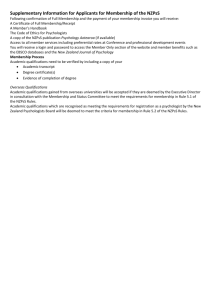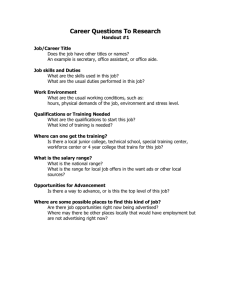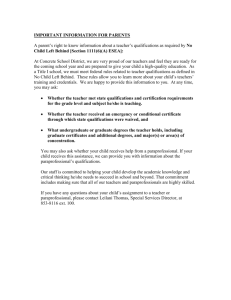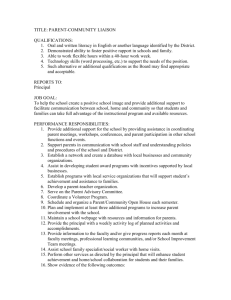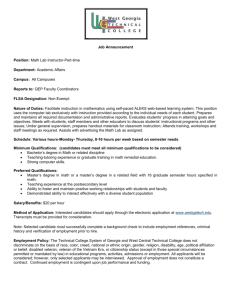Progress 8 factsheet - Manchester Health Academy
advertisement
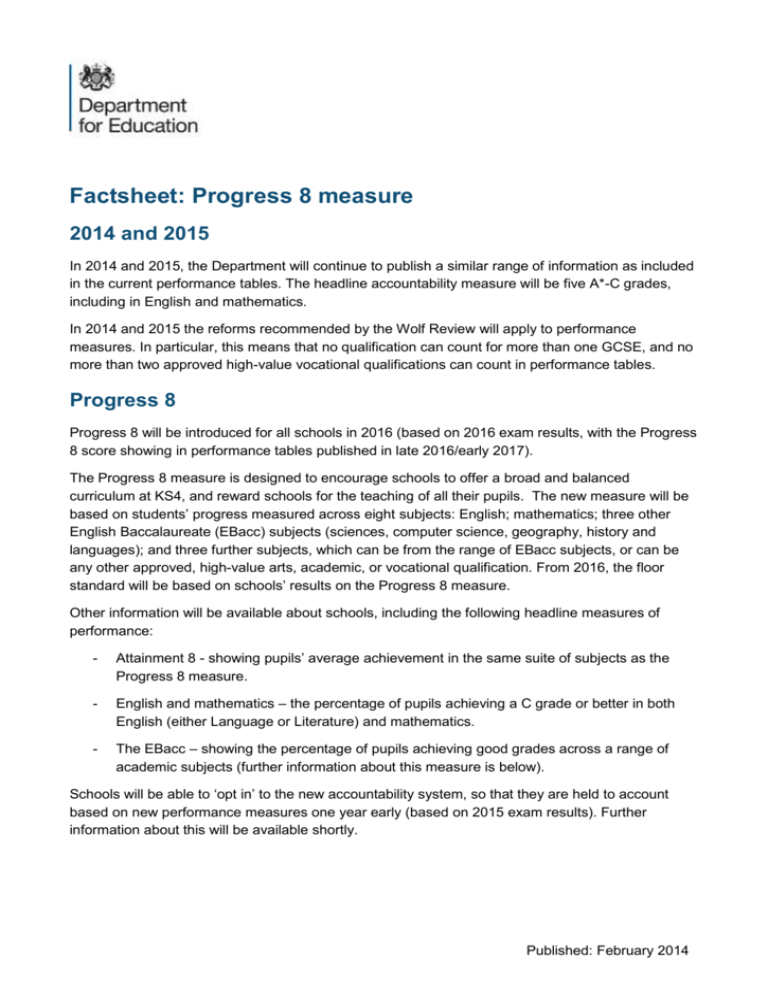
Factsheet: Progress 8 measure 2014 and 2015 In 2014 and 2015, the Department will continue to publish a similar range of information as included in the current performance tables. The headline accountability measure will be five A*-C grades, including in English and mathematics. In 2014 and 2015 the reforms recommended by the Wolf Review will apply to performance measures. In particular, this means that no qualification can count for more than one GCSE, and no more than two approved high-value vocational qualifications can count in performance tables. Progress 8 Progress 8 will be introduced for all schools in 2016 (based on 2016 exam results, with the Progress 8 score showing in performance tables published in late 2016/early 2017). The Progress 8 measure is designed to encourage schools to offer a broad and balanced curriculum at KS4, and reward schools for the teaching of all their pupils. The new measure will be based on students’ progress measured across eight subjects: English; mathematics; three other English Baccalaureate (EBacc) subjects (sciences, computer science, geography, history and languages); and three further subjects, which can be from the range of EBacc subjects, or can be any other approved, high-value arts, academic, or vocational qualification. From 2016, the floor standard will be based on schools’ results on the Progress 8 measure. Other information will be available about schools, including the following headline measures of performance: - Attainment 8 - showing pupils’ average achievement in the same suite of subjects as the Progress 8 measure. - English and mathematics – the percentage of pupils achieving a C grade or better in both English (either Language or Literature) and mathematics. - The EBacc – showing the percentage of pupils achieving good grades across a range of academic subjects (further information about this measure is below). Schools will be able to ‘opt in’ to the new accountability system, so that they are held to account based on new performance measures one year early (based on 2015 exam results). Further information about this will be available shortly. Published: February 2014 How many qualifications will count towards the Progress 8 measure Although Progress 8 encourages students to take eight qualifications, this is not compulsory. If a student has fewer than eight qualifications or the qualifications they do sit are not on the list of subjects which count towards Progress 8, they will score 0 points for the unfilled slots. The Progress 8 score will always be determined by dividing the points total by 10 (the eight qualifications with English and mathematics counting double), regardless of how many qualifications the student sits or in which subjects. It can be of more benefit to less-able students to strive for good grades (and hence score more points) in fewer subjects, with the emphasis on doing well in English and mathematics, than to take more subjects but achieve lower grades overall. Qualifications that will count towards the Progress 8 measure All full-course GCSEs count towards the Progress 8 measure, along with approved, high-value qualifications. English Baccalaureate qualifications Only qualifications that count towards the EBacc can be included in the Progress 8 slots reserved for English, mathematics, and the three ‘EBacc slots’. There are no stipulations about the types of EBacc subjects which can count in the three EBacc slots. Any combination of EBacc subjects can be used to fill these slots, e.g. biology, chemistry physics; computer science, French, German; history, geography, Spanish. For a list of qualifications that count towards the EBacc, see: English Baccalaureate: eligible qualifications. This list will be amended shortly to show the qualifications eligible for 2016 performance measures – the amended list will be similar, but will take into account new qualifications that meet the criteria to be included for the EBacc and it will include acceptable English Literature qualifications. Other approved qualifications Up to three vocational qualifications can count towards the Progress 8 measure. As the Progress 8 measure will comprise eight subjects rather than the five in the current headline measure of school performance, it is proportionate to increase the number of vocational qualifications that will be allowed from two to three. In the open group of subjects, any GCSE can count, or any of the high-value, approved vocational and academic qualifications shown at this link: Vocational qualifications for 14- to 19-year olds. 2 Discounting Discounting codes will apply to qualifications that cover similar subject matter. For further information about discounting, see: RAISEonline: further details of the revised performance tables qualifications and discount rules from 2014. Double-weighting of English If a student sits both English Language and English Literature, the higher grade is double-weighted. The lower grade will still count in the ‘open group’ of subjects (not in the EBacc slots). The combined English Language and Literature qualification will be available for the last time in 2016 and will count double in the Progress 8 measure on the basis that there is an element of Literature study in the qualification. Science subjects All students have to study some science up to the age of 16. The KS4 science curriculum is compulsory in maintained schools and academies are required to provide a broad and balanced curriculum (including English, mathematics and science up to the age of 16.) Double science will count as two slots, and core and additional science GCSE will take up one slot each in the Progress 8 measure. Core science GCSE alone will only count as one slot. Separate GCSEs in biology, chemistry, physics and computer science each count as one slot. All these qualifications will count in the EBacc slots in this measure. Students who are capable of achieving good grades should be encouraged to sit individual science subjects. Changes to science GCSEs From 2016, there will be no GCSE Single Award in Combined Science, and so this qualification will not be reported from 2018 performance tables onward. The Department will be consulting on new science GCSEs in spring 2014 for teaching from 2016. It is expected that these will offer more challenging content than the present courses. 3 EBacc measure The EBacc measure will continue to be reported once Progress 8 is in place. The EBacc recognises the success of those young people who attain GCSEs, or accredited versions of established iGCSEs, at grades A*- C across a core of academic subjects - English, mathematics, geography or history, the sciences and a language. To fulfil the EBacc, a pupil would need A*-C in English, mathematics, two sciences, a humanities and a language. To achieve the science element of EBacc, students need to achieve A*-C in core and additional science or be examined in three of biology, chemistry, physics and computer science and achieve A*-C in two of these subjects. Computer science has recently been added to this list. Further advice on secondary accountability reforms For the government response to the consultation on secondary school accountability published on 14 October 2013, see: Consultation response: secondary school accountability consultation. Also available on this webpage is the January 2014 government update on the Progress 8 measure, including information about the point score system and position of English Literature in the Progress 8 measure. The final methodology for calculating the Progress 8 measure will be published later this term. © Crown copyright February 2014 4




